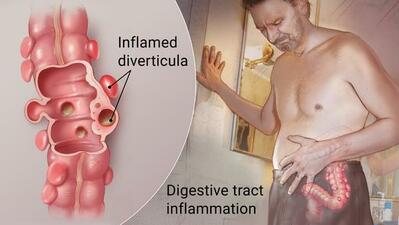|
Extreme pain in your legs or back may be due to disc herniation or a pinched sciatic nerve (sciatica). Caring for Sciatica / Disc Herniation
The video below shows a very gentle way to traction the discs of the low back. It takes the pressure off the sciatic nerve and helps the disc to heal by pulling fluid and nutrition into the disc. Do this exercise as often as you like. It may be one of the few positions that is comfortable for you. Book online now.  Diverticulosis is the condition of having out-pouchings, or diverticula, along the walls of the colon. Whereas diverticulosis does not usually cause symptoms, diverticulitis occurs when diverticula become inflamed and infected. The infection starts when an out-pouching becomes blocked by a piece of hard stool. This blockage leads to bacterial overgrowth, followed by inflammation, infection, and abscess formation. At its most severe, diverticulitis can lead to abscess rupture, allowing stool to enter the abdominal cavity, resulting in sepsis, a life-threatening blood infection.(1) Since the underlying cause of infection is blockage by hard stool, followed by bacterial overgrowth, the key to prevention is to maintain a schedule of regular, soft bowel movements. To accomplish that the best strategy is lots of water, probiotics, fiber rich foods, a good BM routine (i.e. after breakfast daily) and reduce stress.(2) We'll address each of these factors separately. Water: A good rule of thumb is a daily intake of half your body weight in ounces of water. For example a 150lb person should drink 75 ounces of water daily. That's about 4 1/2 16.9 ounce bottles. Probiotics: The gut is populated with millions of different types of bacteria that help us digest our food and also feed the lining of intestines. A good balance of beneficial probiotics will prevent infection by harmful bacteria. I recommend Align Probiotic Supplement, which is available at most major drug stores. Take them daily to reduce constipation and boost the immune system. Once you establish a good bowel movement routine, I would back off on supplementing with probiotics daily and only use them when you need extra support. Instead, I recommend "growing your own" probiotics by eating fiber (probiotics eat fiber) and eating fermented foods which are rich in probiotics. Fiber: Rather than taking a fiber supplement, it is much better to get lots of fiber via nutritious fruits, vegetable and legumes. I recommend a diet that is mostly vegetables, fruit and legumes with fats like olive oild which is rich in Omega 3, 6, 9. Eat less meat. Eat little or no grains. Eat little or no dairy and little or no sugar. This diet provides all the fiber you need plus lots of vitamins, minerals, proteins and essential fatty acids. When choosing foods it is most important to listen to you body. If you eat something and then have bowel irritation or irregularity - take note of what food that might be associated with! Eat foods that are high in fiber PLUS probiotic like fermented, organic, non-pasteurized foods: apple cider vinegar, pickles, sauerkraut, kimchi, miso, tempeh. If you are sure you are not sensitive to dairy you can add kefir and yogurt. You can make your own fresh refrigerator pickles. See below. Super foods that provide fiber PLUS probiotic PLUS detoxification PLUS antioxidant are fermented crucferous veggies like broccoli, cauliflower, Brussels sprouts, cabbage, kale, radish, turnip, bok choy and rutabaga. Crucferous vegetables are rich in glucosinolates which help keep your gut healthy, help with liver detoxification, kill free radicals and prevent cancer with antioxidants. Refrigerator pickles
The body's natural reaction to stress is to move blood flow away from the intestines and toward the muscles. (If you are running from a lion digestion is not your priority.) This is why it's important to relax while eating and digesting. Remember there are many types of stress. We think of stress as mental or emotional, but other types of stress include physical stress such as poor sleep, poor posture or injury; chemical stress such as dehydration and exposure to food additives; and thermal stress such as being over heated or hypothermia. All your stresses add up and go on the same stress pile. So reduce the pile where you can, for example, get enough rest, enough exercise, enough water, avoid food additives and avoid food sensitivities. Develop Good Bowel Habits: To prevent diverticulits keep the bowel soft and moving. Make healthy BMs a priority. So at least one BM a day. Create a routine such as after breakfast; sit, relax, breathe. Do not ignore the urge to go. You want to cultivate that reflex. If you have too push hard or can't go use an enema. Enemas are not the first choice but it's better than not going at least daily. See Notes below for enema instructions and other tips to develop good bowel habits. Notes: 1.) I do not recommend fiber supplements such as psyllium. Psylium is made from a Eurasian plantain, the seeds are ground and used as a source of fiber and bulk. It is not a natural food for humans. Some people are severely allergic to it. Also if you eat anything daily you are more likely to develop a sensitivity. 2.) I do not recommend coconut oil as many people are sensitive to it, especially those with blood type O. 3.) For other tips see: "Develop Good Bowel Habits" (via the IBS Network) 4.) Enema: Step By Step Tutorial + FAQ'S (YouTube) 5.) Wheat and dairy are the most common food sensitivities. And I emphasize wheat not just gluten. 6.) Some find the Squatty Potty helpful. Raising your legs relaxes the ligament that lifts the lower bowel. Reference: (1) Diverticular disease of the colon. Lancet. 2004 Feb 21;363(9409):631-9. (2) New strategies for the management of diverticular disease: insights for the clinician. Therap Adv Gastroenterol. 2013 May; 6(3): 205–213. (3) The cancer chemopreventive actions of phytochemicals derived from glucosinolates. European Journal of Nutrition May 2008, Volume 47, Supplement 2, pp 73–88 (4) Wisconsin Safe Food Preservation Series. B2267 University of Wisconsin-Extension Cooperative Extension |
Archives
September 2022
CategoriesAll Activator Allergy Anxiety Applied Kinesiology Autoimmune Disease Back Pain Back Spasm Blood Pressure Breastfeeding Bunions Cancer Cancer And Sprit Chiro Saves Money Depression Disc Disease Energy Work Flu Foot Pain Green Smoothies Gut Health Healthy Boundaries Heart Disease Hip Flexor Home Care Hormone Disruptors Immune Strength Juicing Kidney Liver Love Neck Pain Newborn Nutrition Piriformis Syndrome Posture Protein And Diet Psoas Reiki Scar Reduction Sciatica Second Career Skincare Sleep Spinal Arthritis Stand Up Desks Stress Stroke Traction Types Of Stress Yoga Sandals |
